Waymo, a frontrunner in the realm of autonomous vehicles, has recently announced its ambitious plans to expand operations into Japan, specifically Tokyo. This endeavor marks a significant milestone as it is the first instance of Waymo deploying its vehicles on public streets outside the United States. The initiative is positioned not merely as a market penetration tactic but rather as a comprehensive data collection project aimed at understanding the unique driving dynamics prevalent in Japan, an essential precursor for any future launch of autonomous services in the area.
Labeling the undertaking as a “road trip,” Waymo intends to meticulously gather data that encompasses the intricacies of Japanese traffic regulations, which notably involve left-hand driving—a stark deviation from Waymo’s operations in the U.S. This effort includes navigating Tokyo’s densely packed urban environment. For this exploratory phase, Waymo is adopting a hands-on approach; the vehicles will initially be driven manually to log crucial mapping data. Local taxi fleet operator Nihon Kotsu will oversee these operations, ensuring compliance with Japanese regulations and norms. This strategic partnership not only highlights Waymo’s focus on local collaboration but also its understanding of the importance of a market-specific approach in the deployment of autonomous technology.
As of now, approximately 25 autonomous vehicles are set to be shipped to Tokyo, with the first batch expected to arrive in early 2025. While there is speculation about a prospective robotaxi service in Japan, Waymo has been clear in its communication that there are no immediate plans for outright commercial service provision. Sandy Karp, a spokesperson for Waymo, asserted that the primary goal is to gain insights into how their technology aligns with Japan’s transportation landscape. This cautious approach reflects Waymo’s broader strategy of reinforcing its system before branching out into fully autonomous ride-hailing services in new territories.
Waymo’s partnership with Nihon Kotsu, combined with the involvement of the widely-used GO taxi app, may be an indication of a future collaborative framework between Waymo’s autonomous systems and established local mobility services. This strategy has precedent in the U.S., where Waymo has integrated its technology with Uber’s ride-hailing services in cities like Austin and Atlanta. Such collaborations could herald an evolution of the traditional taxi service model in Japan, providing commuters with innovative transportation options augmented by self-driving technology.
While Waymo’s move into Tokyo underscores its commitment to expanding its global presence, it also entails navigating a complex landscape, particularly in a nation where the automotive sector is traditionally strong. Japan, known for its well-established automotive companies such as Toyota and Nissan, faces unique challenges regarding the acceptance of foreign autonomous technology. Moreover, many local manufacturers are currently focusing their autonomous ventures in partner countries like China, a market that is perceived as more favorable for such innovations. Waymo’s challenge will be to effectively demonstrate its technology’s reliability and safety to gain the trust of Japanese commuters.
This international expansion comes at a time when numerous companies in the autonomous vehicle sector are reassessing their strategies. With General Motors recently announcing a strategic pivot away from its Cruise subsidiary to focus on driver-assist technologies and personally owned autonomous vehicles, Waymo’s venture could be seen as a bold statement of confidence in its capacities. The company reported an impressive volume of 175,000 paid rides per week within the United States, a testament to its existing operational strength. This growth can potentially bolster Waymo’s position as it seeks to implement its technology internationally.
Ultimately, Waymo’s foray into Tokyo represents both a learning opportunity and a commitment to an international growth trajectory in autonomous vehicle technology. As it embarks on this unique path, the integration of local knowledge with cutting-edge technology will be pivotal. Whether Waymo can successfully navigate the complexities of the Japanese market remains to be seen, yet its cautious optimism may pave the way for future advancements in global autonomous vehicle operations. In a world increasingly leaning toward innovative transport solutions, Waymo’s strategic maneuvers could significantly influence the evolution of urban mobility in diverse settings.


Leave a Reply